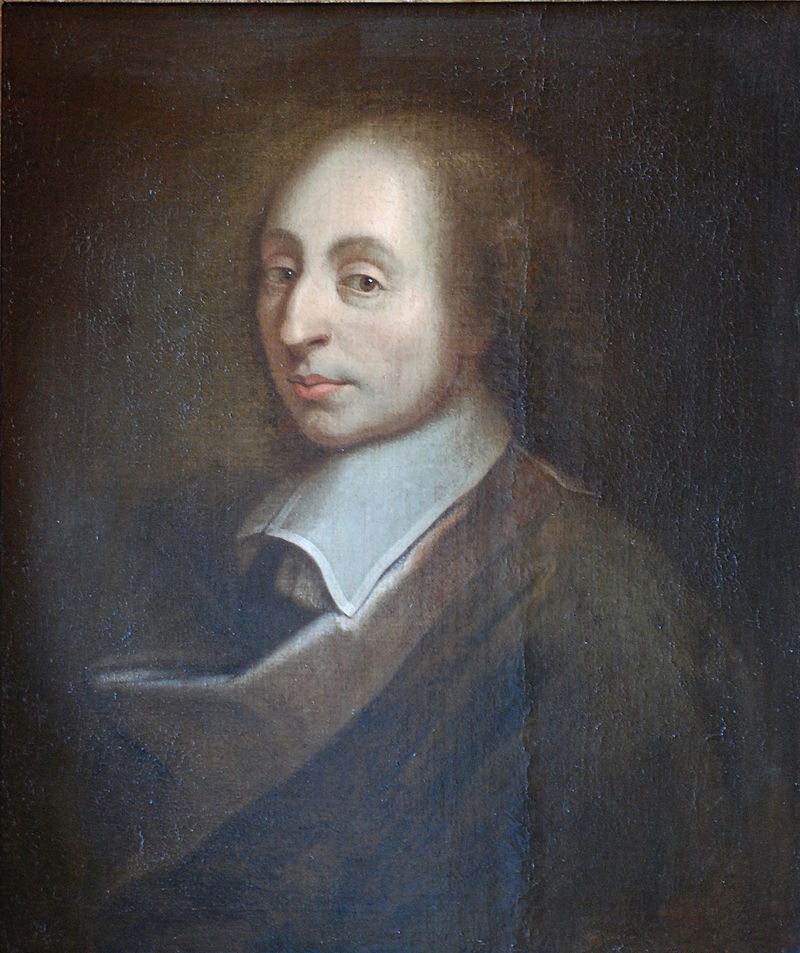“The heart has its reasons which reason knows not.”
― Blaise Pascal
wikipedia:
| Born | 19 June 1623 Clermont-Ferrand, Auvergne, France |
|---|---|
| Died | 19 August 1662 (aged 39) Paris, France |
| Residence | France |
| Nationality | French |
| Religion | Roman Catholic |
| Era | 17th-century philosophy |
| Region | Western philosophy |
| School |
|
|
Main interests
|
|
|
Notable ideas
|
|
–
Blaise Pascal (19 June 1623 – 19 August 1662) was a French mathematician,physicist, inventor, writer and Christian philosopher. He was a child prodigy who was educated by his father, a tax collector inRouen. Pascal’s earliest work was in the natural and applied sciences where he made important contributions to the study of fluids, and clarified the concepts of pressure and vacuum by generalizing the work of Evangelista Torricelli. Pascal also wrote in defense of the scientific method.
In 1642, while still a teenager, he started some pioneering work on calculating machines. After three years of effort and fifty prototypes, he built 20 finished machines (called Pascal’s calculators and later Pascalines) over the following ten years, establishing him as one of the first two inventors of the mechanical calculator.
Pascal was an important mathematician, helping create two major new areas of research: he wrote a significant treatise on the subject of projective geometry at the age of 16, and later corresponded with Pierre de Fermat on probability theory, strongly influencing the development of modern economics and social science. Following Galileo and Torricelli, in 1646, he refutedAristotle’s followers who insisted that nature abhors a vacuum. Pascal’s results caused many disputes before being accepted.
In 1646, he and his sister Jacqueline identified with the religious movement within Catholicism known by its detractors as Jansenism. His father died in 1651. Following a religious experience in late 1654, he began writing influential works on philosophy and theology. His two most famous works date from this period: the Lettres provinciales and the Pensées, the former set in the conflict between Jansenists and Jesuits. In that year, he also wrote an important treatise on the arithmetical triangle. Between 1658 and 1659 he wrote on the cycloid and its use in calculating the volume of solids.
Pascal had poor health, especially after his 18th year, and his death came just two months after his 39th birthday.
–
Unsung Philosophers: Blaise Pascal – Nice tribute from youtube
–
Blaise Pascal (1623-1662) Pensées (from philosophybites.com)
–
Quotes
“All of humanity’s problems stem from man’s inability to sit quietly in a room alone.”
― Blaise Pascal, Pensées–
“I have only made this letter longer because I have not had the time to make it shorter.”
(Letter 16, 1657)”
― Blaise Pascal, The Provincial Letters–
“Men never do evil so completely and cheerfully as when they do it from religious conviction.”
― Blaise Pascal, Pensées–
“I would prefer an intelligent hell to a stupid paradise.”
― Blaise Pascal–
“Kind words don’t cost much. Yet they accomplish much.”
― Blaise Pascal–
“You always admire what you really don’t understand.”
― Blaise Pascal–
“I lay it down as a fact that if all men knew what others say of them, there would not be four friends in the world.”
― Blaise Pascal–
“People almost invariably arrive at their beliefs not on the basis of proof but on the basis of what they find attractive.”
― Blaise Pascal, De l’art de persuader–
“Truth is so obscure in these times, and falsehood so established, that, unless we love the truth, we cannot know it.”
― Blaise Pascal–
“All men seek happiness. This is without exception. Whatever different means they employ, they all tend to this end. The cause of some going to war, and of others avoiding it, is the same desire in both, attended with different views. The will never takes the least step but to this object. This is the motive of every action of every man, even of those who hang themselves.”
― Blaise Pascal–
“When one does not love too much, one does not love enough.”
― Blaise Pascal–
“The last thing one discovers in composing a work is what to put first.”
― Blaise Pascal, Pensées–
“Man’s sensitivity to the little things and insensitivity to the greatest are the signs of a strange disorder.”
― Blaise Pascal–
“It is man’s natural sickness to believe that he possesses the truth.”
― Blaise Pascal–
“The greater intellect one has, the more originality one finds in men. Ordinary persons find no difference between men.”
― Blaise Pascal, Pensées–
“If we submit everything to reason our religion will be left with nothing mysterious or supernatural. If we offend the principles of reason our religion will be absurd and ridiculous . . . There are two equally dangerous extremes: to exclude reason, to admit nothing but reason.”
― Blaise Pascal, Pensées

